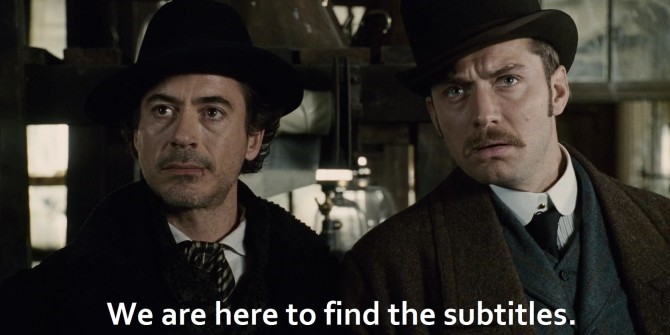One of the best ways to practice in the new language is by watching movies with subtitles. It is true that a movie can offer us, in a simple way, the opportunity to absorb the sounds and the pace characterizing a language, hear words and phrases that we have learned in books, now being used and the most important of all? Get a glimpse of the temperament and psychology of its people, which will eventually lead us to deeper understanding of the language itself and a quicker assimilation.
1. NO to having no subtitles.
We often seem to wonder if it is better to have subtitles in greek, in the language that we are currently learning or have no subtitles at all. And here comes the first NO! It is true that most of us get carried away from excitement, rush to make progress and therefore decide to start watching movies in the other language with no subtitles.
Not only will this not help us learn things more quickly, but it may also impede our progress. Whichever level of learning we are in, we should bear in mind that we are still students of this language. There are thousands of words and phrases that either we haven’t been taught yet or we can’t yet clearly recognize throughout a movie. The result is that we tend to miss entire dialogues, explanations or narrating, vital for the unwrapping of the plot. We often miss great parts of what is going on and while trying to catch up, the movie has already ended. To make matters worse, after two or three similar unsuccessful attempts, we feel completely dissatisfied, upset with ourselves for making little or no progress in understanding and we finally decide to quit.
2. NO to frequent pauses.
Another mistake we tend to make while still being students of a foreign language is pressing “Pause” and “Resume” in our remote control! Either there are subtitles in greek, either in the language that we learn or no subtitles at all, a lot of people, right before the movie starts, next to their pop-corn and cola, have a pen and paper. Why is that? Of course because they don’t want to miss anything! This is a form of practice, remember?
So, every two to five minutes, depending on the level in the foreign language, this type of students press “Pause”, because something had just been said that they didn’t hear well, didn’t understand or have never heard before in their lives. So, they go a little bit backwards and repeat the same scene. If they get it this time, the movie can go on. If they don’t they write this phrase down on their piece of paper in order to search it afterwards…and in this way, my friends, a new kind of torture has just been invented!
We shouldn’t forget the reason why we initially decided to watch this movie in the language that we are learning. Of course we do that in order to get to know to the civilization of that country and find out more things about it. But certainly not like this! Trust me, our mind is smart enough, while watching a movie, to skip parts that it does not comprehend, to stick to the main plot and development of the story and store phrases and words that feels they are essential for the daily communication.
So let’s enjoy the movie and our mind will take care of the rest!
3. NO to whole movies.
Watching a whole movie in the foreign language that we aim to conquer never stops representing a small challenge even for the best of students. Any activity that lasts at least two hours in that language without breaks, is natural to make us tired and unwilling to complete it. The same goes here, when it comes to a movie, whatever type of subtitles we have or haven’t decided to use.
So, what do we do? Before reaching the higher levels of a language, we can try watching a series in that language! All series consist of a number of shorter, complete episodes that are certain not to tire us and that we will be able to finish watching. Apart from that, we will look forward to anticipating the development of the story, we will be watching more often and this repetition will significantly improve learning.
4. YES to having subtitles in the foreign language.
From the three choices we examine- subtitles in the foreign language, in greek or no subtitles- the most preferable one is to have subtitles in the language that we learn. If we select once more the greek ones, then our mind will relax and will soon not even pay the slightest attention to the language spoken. On the other hand, if we have no subtitles at all, as we said before, the process of understanding will get too difficult and will discourage us from continuing.
If we place subtitles in the target language, in the same language that the movie was directed, we achieve a lot more. In the start, the words or phrases that we listen- or think we listen- we confirm or not by what we see written. Even in the case that we hear something we don’t know, we see it written straight afterwards. Its meaning? We can understand that from the context!
5. YES to foreign subtitles until we don’t need them anymore.
The ultimate goal of this whole process in the long-term is to learn how to understand and communicate in the new language. And this is going to be just another step leading us there. The more we practice in this way, the quicker will come the moment that we will feel an ease to understand a big part of the movie, and later on all of the movie, without the help of subtitles. This is a thought to keep in mind but not to make us stressed. We should feel reassured that there will come a moment, without consciously making an effort, that we will be able to watch and understand an entire movie in a foreign language.
6. YES to having foreign subtitles as they improve our perception of the language.
Each language functions as a living organism and is characterized by certain traits which differentiate it from all others. Its rhythm, its musicality, its sounds are not the same to the ones we experience in our native language. The interjections and the instinct reactions of its people are certainly elements that we cannot learn through books. We can absorb them through movies, in which we experience the language more vividly. This type of contact with the foreign language will definitely lead us to a more thorough learning.


5 Responses
Utterly pent articles, thank you for information. “He who establishes his argument by noise and command shows that his reason is weak.” by Michel de Montaigne.
Thank you for your beautiful comment!
Thank you!
You are a very intelligent person!
Thank you so much for appreciating this article!